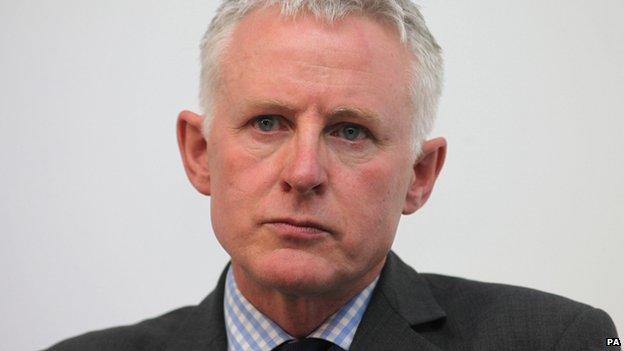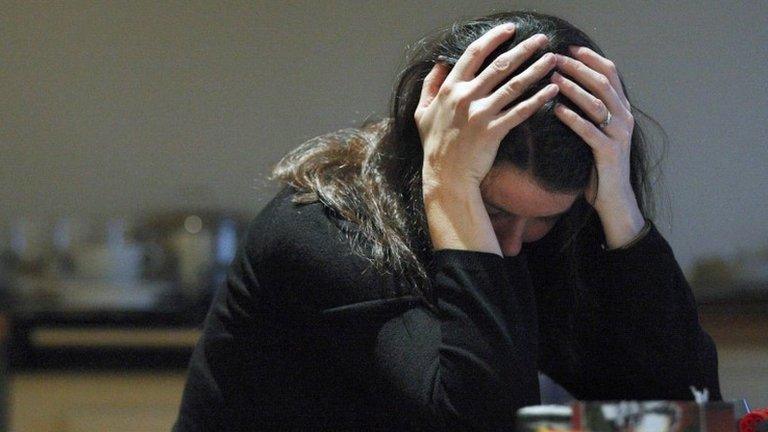Patients sectioned 'because of pressure on beds'
- Published
.jpg)
Pressure on mental health beds is so severe that some patients are having to be sectioned to secure necessary care, a survey of junior doctors suggests.
The Royal College of Psychiatrists questioned 576 trainees working in psychiatry across the UK.
The college said its findings suggested mental health services were approaching a "tipping point" and that the situation was "simply unacceptable".
Ministers said inpatient beds should be available for those who needed them.
The survey also suggests that critically unwell patients are being sent home because no bed can be found for them.
Children moved
Investigations in recent months by BBC News and the online journal Community Care have highlighted that more than 1,700 mental health beds have been cut and that patients are travelling huge distances to access care.

Sectioning someone under the Mental Health Act - denying them their liberty - should only be done when a person is a risk either to themselves or others. It is a legal process led by a social worker (an approved mental health professional) working alongside 2 doctors. A patient cannot be sectioned purely to secure a bed, but this survey suggests doctors are being influenced towards detaining someone if it'll make it more likely a bed can be accessed.
The key findings include:
Some 18% said their decision to detain a patient under the Mental Health Act (section someone) had been influenced by the fact that doing so might make the provision of a bed more likely; 37% said a colleague's decision had been similarly influenced
One-in-four said a bed manager had told them that unless their patient had been sectioned they would not get a bed
Almost 30% have sent a critically-ill patient home because no bed could be found
A third had seen a patient admitted to a ward without a bed
And 22% had been forced to send a child more than 200 miles from their families for treatment
Doctors also reported sending adult patients long distances to access care and admitting people into a bed belonging to another patient who had been sent home for a period of trial leave.
'Very alarming'
One young psychiatrist, who did not want to be named, told BBC News that a patient had died as a result of not being able to secure a bed locally.
"The patient presented to us, they needed to be admitted, we couldn't admit them locally, they were admitted to a hospital hundreds of miles away.
"The care they received was not what we'd have done and they died."
The findings have been condemned by the college.

Minister Norman Lamb said the NHS should treat mental and physical health services equally
Dr Howard Ryland, who oversees its psychiatric training described them as "very alarming".
"People are beginning to recognise that there is a real crisis in mental health," he added.
"This survey shows a picture of the very severe pressure that frontline staff are under in terms of securing the care that people need.
"The NHS doesn't have the resources to cope with the ever increasing demand. The system doesn't have the services to provide everyone with the care they need."
'Vulnerable'
His comments were supported by the Prof Bailey, president of the college, who said: "This survey provides further evidence that mental health services are approaching a tipping point.
"Continued cuts to services can only result in further distress and discomfort for patients, many of whom are young, vulnerable, some of whom are forced to receive care far from home. This situation is simply not acceptable."
The mental health charity SANE called the situation a scandal.
Labour's Shadow Health Minister Luciana Berger urged the government to take responsibility and "get to grips with this unacceptable failure before more lives are put at risk."
In a statement, care minister Norman Lamb said: "It is not acceptable to detain someone under the Mental Health Act purely because they need an inpatient bed.
"Decisions about detention must always be taken in the best interests of patients at risk of harming themselves or others.
"Inpatient beds must always be available for those who need them. We are scrutinising local NHS plans to make sure they put mental health on a par with physical health."
- Published16 October 2013

- Published6 May 2014
